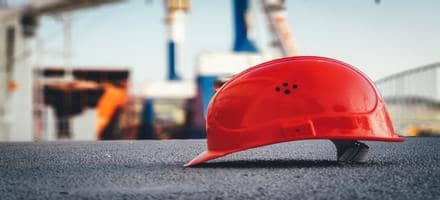From abrasive tools spitting up chunks of raw material to slick surfaces after a good polish, there is a whole spectrum of dangers that threaten the safety of concrete surface workers. This, of course, is why we have the Occupational Safety and Health Administration (OSHA) to regulate safety measures.
Personal protective equipment (PPE) is one of those measures, and PPE requirements tend to evolve over time in any given industry. It’s good to be up-to-date on the current standard details so you know how to approach your project safely.
At Runyon Surface Prep, we supply professionals in the field with concrete surface prep equipment and accessories for a wide range of project needs. Like OSHA, we want workers in the surface prep industry prepared and protected. Read on for information on current PPE standards in grinding and polishing.
What Does PPE Protect Me From?
First, to understand why these PPE requirements are in place, it may help you to know what the dangers are. There are obvious dangers, of course. That is, the heavy machinery, the slippery floors, lack of protective rails, and projectiles from abrasive equipment. But then there are other dangers that are not so obvious – crystalline silica, for example.
To some in the industry, this material is the primary villain threatening safety compliance and worker health. Crystalline silica is a particle inherent in concrete’s makeup that, when kicked up by equipment, becomes a breathing hazard to workers. Inhaling crystalline silica could result in permanent lung damage and even fatal diseases.
Other lesser-known dangers can include loosely worn clothing, inadequately mixed chemicals, and electrical hazards.
PPE Requirements – What to Wear
Concrete grinding and concrete polishing are abrasive actions – they shape surfaces and materials by way of friction. So, there are numerous dangers at play when workers grind and polish. OSHA requires the following PPE when working with abrasives:
- Hearing protection
- Face and eye protection like face shields
- Helmet or hardhat
- Adequate safety boots
- Hand and forearm protection
- Coveralls
Additionally, a NIOSH (National Institute for Occupational Safety and Health) approved respirator must be used and covering “the wearer’s neck, head, and shoulders.” OSHA also requires that employers have a comprehensive respiratory protection program in place for operations requiring respirators.
What Type of PPE Items Are Acceptable?
While there are equipment types that are relatively universal in their style and protective qualities, some are engineered to protect you better than others.
Hard Hats
Hard hats are required whenever “there is a possible danger of head injury from impact, or from falling or flying objects, or from electrical shock and burns…”
Different circumstances will require different types of hard hats. There are two types of hats for impact protection (Type I and Type II), for example, and three classes for electrical protection hard hats (Classes E, G, and C).
- Type I, Impact Protection: protects the top of the head from impact dangers.
- Type II, Impact Protection: protects sides and top of the head from overhead and lateral impact dangers.
- Class E, Electrical: protects the head by reducing exposure to high voltage conductors.
- Class G, General Electrical: protects the head by reducing exposure to low voltage conductors.
- Class C, Conductive: do not protect against electrical conductor contact but provide impact protection and breathability via conductive material or ventilation.
Face Shields
OSHA states that face shields must adequately protect the face or eyes when exposed to flying particle hazards (among other qualities like the prevention of liquid chemicals). They must also be reasonably comfortable and fit snugly, not interfering with the worker’s maneuverability and they must be easily cleaned.
Safety Boots
Protective footwear in concrete surface prep and like industries must prevent dangers posed by the following:
- Hot or corrosive materials
- Electrical hazards
- Heavy or penetrating objects
- Rolling equipment
Note also that some employers are required to provide impact-resistant boots compliant with ASTM standards.
Protected and Ready to Get Started? Reach Out to Runyon Today
At Runyon Surface Prep, we have concrete surface prep tools and accessories designed to get the job done thoroughly and efficiently. From specific-use grinders and ride-on power trowels to epoxy coating and concrete dyes, we’ve got you covered from start to finish.
Our equipment is available for rent or purchase. Connect with us to learn more.
